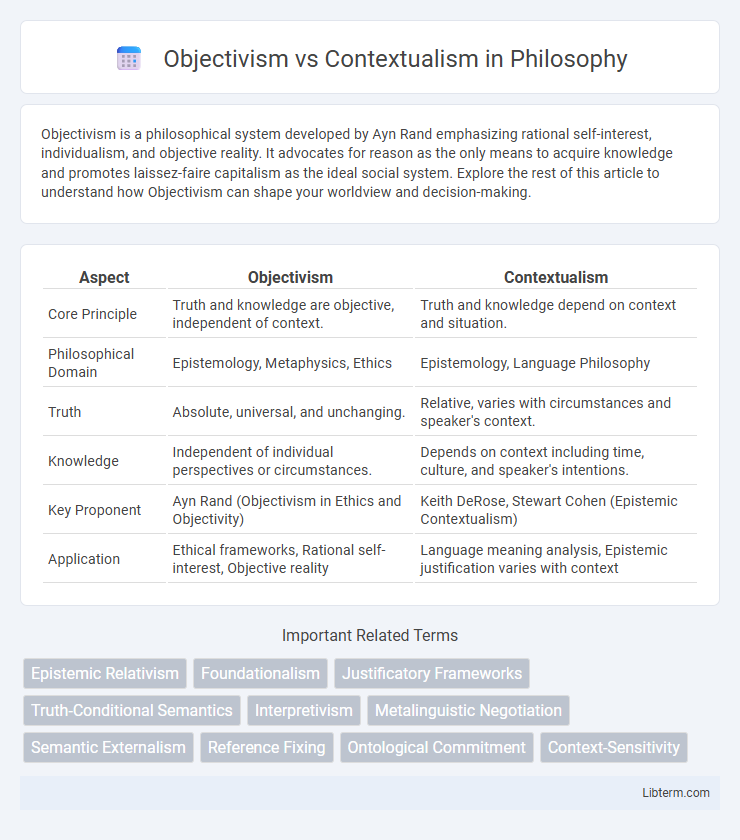Objectivism is a philosophical system developed by Ayn Rand emphasizing rational self-interest, individualism, and objective reality. It advocates for reason as the only means to acquire knowledge and promotes laissez-faire capitalism as the ideal social system. Explore the rest of this article to understand how Objectivism can shape your worldview and decision-making.
Table of Comparison
| Aspect | Objectivism | Contextualism |
|---|---|---|
| Core Principle | Truth and knowledge are objective, independent of context. | Truth and knowledge depend on context and situation. |
| Philosophical Domain | Epistemology, Metaphysics, Ethics | Epistemology, Language Philosophy |
| Truth | Absolute, universal, and unchanging. | Relative, varies with circumstances and speaker's context. |
| Knowledge | Independent of individual perspectives or circumstances. | Depends on context including time, culture, and speaker's intentions. |
| Key Proponent | Ayn Rand (Objectivism in Ethics and Objectivity) | Keith DeRose, Stewart Cohen (Epistemic Contextualism) |
| Application | Ethical frameworks, Rational self-interest, Objective reality | Language meaning analysis, Epistemic justification varies with context |
Understanding Objectivism: Core Principles
Objectivism centers on the belief that reality exists independently of perception, emphasizing objective truth and rational self-interest as fundamental principles. It advocates for reason as the only means of acquiring knowledge, rejecting emotions or social context as valid guides. The philosophy upholds individual rights and laissez-faire capitalism as natural outcomes of objective morality.
Defining Contextualism: An Overview
Contextualism emphasizes the importance of situational factors in interpreting meaning, arguing that understanding depends on the context in which information is presented. Unlike Objectivism, which holds that meanings and truths are fixed and independent of circumstances, Contextualism asserts that variations in context can alter the interpretation of concepts or statements. This approach is widely applied in language philosophy, epistemology, and legal theory to address how meaning shifts based on environmental, cultural, or conversational conditions.
Historical Origins of Objectivism and Contextualism
Objectivism originated in early 20th-century philosophy with Ayn Rand's emphasis on rational self-interest and objective reality, rooted in Aristotelian metaphysics and Enlightenment ideals. Contextualism emerged from linguistic and epistemological challenges in the mid-20th century, particularly through the works of philosophers like David Kaplan and Stephen Schiffer, emphasizing the dependence of meaning and knowledge on situational contexts. The historical divergence highlights objectivism's commitment to absolute truths contrasted with contextualism's focus on flexible interpretation shaped by linguistic and social environments.
Key Differences Between Objectivism and Contextualism
Objectivism asserts that truth and meaning are fixed and independent of individual perspectives or situations, emphasizing universal principles and objective standards. Contextualism, on the other hand, holds that truth and meaning depend on the context, including situational factors, speaker intentions, and cultural environment. Key differences include objectivism's reliance on immutable truths versus contextualism's focus on variability and adaptability of meaning based on specific circumstances.
Objectivism in Epistemology: Pursuit of Absolute Truth
Objectivism in epistemology emphasizes the pursuit of absolute truth, asserting knowledge exists independently of individual beliefs or cultural perspectives. It champions universal standards of evidence and logic to achieve objective certainty, aiming to identify facts that remain true regardless of context or interpretation. This approach contrasts with contextualism, which holds that truth and knowledge are shaped by situational factors and vary across different environments.
Contextualism in Epistemology: Importance of Circumstances
Contextualism in epistemology emphasizes that the truth conditions of knowledge claims vary depending on the context, highlighting the role of circumstances in evaluating knowledge. This approach challenges the fixed standards of Objectivism by positing that what counts as "knowing" changes according to practical factors such as stakes, conversational context, and the questioner's intentions. By incorporating contextual variables, epistemic justification becomes dynamic, reflecting real-world complexities in belief formation and assessment.
Objectivism vs Contextualism in Ethics
Objectivism in ethics asserts that moral principles are universal, unchanging truths independent of individual beliefs or cultural contexts. Contextualism argues that ethical judgments depend on the context, emphasizing that moral values vary based on cultural, historical, and situational factors. The debate centers on whether ethical norms are absolute or shaped by external circumstances influencing moral reasoning and decision-making.
Practical Implications: Real-world Examples
Objectivism in ethics emphasizes universal moral principles that guide consistent decision-making across cultures, exemplified by human rights laws that apply globally regardless of local customs. Contextualism adapts ethical judgments based on situational variables and cultural nuances, influencing practices like restorative justice systems that tailor responses to community-specific contexts. Businesses leverage objectivist frameworks for compliance standards, while employing contextualist approaches to navigate diverse market behaviors and consumer expectations effectively.
Criticisms and Challenges of Both Frameworks
Objectivism faces criticism for its rigid application of universal moral principles, often overlooking cultural and situational nuances that influence ethical judgments. Contextualism is challenged due to its potential relativism, where excessive emphasis on context may lead to inconsistent or subjective moral standards lacking clear guidance. Both frameworks struggle to balance moral clarity with flexibility, resulting in debates over their practical applicability in diverse real-world scenarios.
Objectivism and Contextualism: Finding a Middle Ground
Objectivism asserts that meaning and truth are fixed and independent of individual perspectives, emphasizing universal principles and objective facts. Contextualism argues that understanding and interpretation depend heavily on situational factors, social contexts, and varying perspectives, highlighting the fluidity of meaning. Finding a middle ground involves recognizing the balance between stable, objective anchors and the flexible, context-sensitive nuances that shape interpretation across different scenarios.
Objectivism Infographic

 libterm.com
libterm.com